Les fiches récentes
30 avril 2024
Interviews

🌐suivre Marie-Anne Frison-Roche sur LinkedIn
🌐s'abonner à la Newsletter MAFR Regulation, Compliance, Law
____
► Référence complète : M.-A. Frison-Roche, "GPA : "Il faut cesser de passer la femme par pertes et profits"", entretien avec Olivia Dufour, Actu-Juridique, 30 avril 2024
____
____
► Présentation de l'entretien par le journal : "Le 23 avril 2024, les députés européens ont adopté une loi élargissant le champ d’application des mesures actuelles pour combattre et prévenir la traite des êtres humains et mieux soutenir ses victimes, par 563 voix pour, 7 contre et 17 abstentions. La maternité de substitution, ou GPA, entre désormais dans le champ de la traite des êtres humains. Mais depuis quelques jours, la polémique fait rage. Le nouveau texte réprime-t-il uniquement la GPA contrainte organisée par une association criminelle, ou toute forme de GPA ? Nous avons demandé au professeur Marie-Anne Frison-Roche, auteur d’un ouvrage intitulé « GPA : dire Oui ou dire Non » publié chez Dalloz en 2018, de nous éclairer sur les enjeux attachés à cette question et sur la position de l’Europe.".
____
🕴️M.-A. Frison-Roche, 📕GPA : dire Oui ou dire Non, 2018
____
► Questions posées, réponses apportées :
Actu Juridique. Question : La GPA est une pratique ancienne même si elle est longtemps restée marginale, qu’est-ce qui a changé et nécessite aujourd’hui l’attention des pouvoirs publics et du législateur ?
Marie-Anne Frison-Roche. Réponse. : deux choses ont fait changé cette pratique. La première est la possibilité d'introduire dans le corps d'une femme les gamètes d'un homme et l'ovocyte d'une femme, ce qui permet à la réduire à n'être que "porteuse" et rendre ce service-là, qui est très demande. La seconde est la transformation du désir d'enfant, désir éternel et commun à beaucoup, en "droit à l'enfant". Ce droit à l'enfant demanderait à être concrétisé par tout moyen, au bénéfice de tout titulaire entravé ou non désireux de subir les inconvénients d'une grossesse. C'est ainsi que la pratique s'est développée. Le législateur est intervenu, suite à la jurisprudence, en déclarant, comme l'avait fait la Cour de cassation, cette pratique contraire à la dignité de l'être humain, sanctionnée par le Code civil comme le Code pénal.
A.J. Q. : Autrement dit, les innovations techniques couplées à l’émergence d’un sentiment de droit à l’enfant ont fait exploser la demande de maternité de substitution…
MaFR. R. : Oui. Mais encore faut-il qu'à cette demande corresponde une offre. Or il y a peu de femmes fertiles prêtes à porter des enfants pour autrui. Au désir d'avoir des enfants ne correspond pas un désir d'en porter pour autrui sans contrepartie. Le peu de femmes disposées à le faire sont d'ailleurs dans des pays éloignées des demandeurs. La pratique ne s'est développée que par le fait d'agences, très prospère, sur lesquelles tout repose. Sans cette intermédiation, vers l'Ukraine par exemple, la pratique n'aurait pu se propager.
A.J. Q. : L’Europe avait-elle déjà pris position sur la GPA et si oui, par quels textes et dans quel sens ?
MaFR. R. : En Europe, c'est la jurisprudence de la CEDH qui en 2014 (arrêts Mennesson) est venu briser la jurisprudence française pour imposer que la filiation de l'enfant né d'une GPA réalisée à l'étranger dans un pays où la GPA est licite puisse être établie à l'égard du père dont les gamètes avaient été utilisées. Il ne restait plus alors qu'à procéder à l'adoption par le conjoint de celui-ci. La législation interne ne fût pas pour autant modifiée mais le fonctionnement de l'état-civil permet de rendre inefficace la prohibition. Mais c'était à la fois dire Non et Oui... L'enjeu fût donc de modifier les textes, soit pour exclure la GPA plus fortement, soit pour l'admettre plus ouvertement.
A.J. Q. : Dans ce contexte, quelle nouveauté apporte le texte adopté par le Parlement européen le 23 avril dernier ?
MaFR. R. : Cela dépend de la façon dont on l'interprète. Quand le texte de la directive était discutée, nul ne contestait que son vote entrainerait la prohibition effective de la GPA sur l'ensemble du territoire de l'Union européenne et le renforcement du fondement de cette prohibition en ce que la GPA constitue la traite d'être humain, la femme qui le porte et qui juridiquement demeure la mère puisqu'elle accouche de l'enfant, et cet enfant. Mais dès voté, le texte donne lieu à une autre interprétation, soutenue par certains. Il s'agirait de soutenir que la traite d'êtres humains n'est pas la "catégorie juridique" dans laquelle s'insère la GPA mais la "condition" à laquelle la GPA est sanctionnée : ainsi si la GPA se pratique sans "commerce" (la traite est un commerce), s'il n'a pas d'argent, s'il n'y a que de l'altruisme et du souci de l'autre, alors non seulement la GPA n'est pas sanctionnée, mais plus encore cette GPA dite "altruiste" devient légitime par le fait-même de cette directive ! La portée devient donc tout simplement opposée... Cela pourrait donner lieu à contentieux.
A.J. Q. : Dans l’ouvrage que vous avez consacré à la GPA en 2018 chez Lefebvre-Dalloz préfacé par Éliette Abécassis, vous montrez qu’on peut dire Oui ou Non à la GPA, mais qu’il faut répondre et surtout vous mettez en lumière les implications de ces choix. Pourquoi faut-il forcément répondre à cette question ?
MaFR. R. : Il faut répondre à cette question de l'admission ou de la prohibition de la GPA (dire Oui ou dire Non) parce que c'est une question de société. Ne pas y répondre, dire ni oui ni non, dire oui et non à la fois, c'est ne pas choisir la société quand laquelle nous voulons vivre.
A.J. Q. : Imaginons que l’on choisisse le Oui. Qu’implique-t-il sur les valeurs de la société et l’état du droit ?
MaFR. R. : Si l'on admet la licéité de la GPA, alors c'est la volonté des personnes impliquées qui fait naître l'enfant. L'accord entre la ou les personnes qui ont le projet d'enfant et la femme qui consent à porter l'enfant, l'agent ayant été l'intermédiateur. C'est la société du contrat, car l'Etat n'est rien, il n'est que le scribe qui recopie les stipulations sur l'état-civil. La filiation cesse d'être l'institution gardé par l'Etat par laquelle l'individu est ancré dans le groupe social. La filiation devient une affaire de vie privée. Cette société du contrat est de fait une société de marché.
A.J. Q. : Et si l’on dit Non à la GPA, on le fait sur quel fondement et pourquoi ?
MaFR. R. : Si l'on maintient la prohibition de la GPA et qu'on cherche son effectivité, notamment en agissant contre les agences, l'on se réfère à une société où l'Etat à travers l'ordre public veille sur les êtres humains et où le Droit contrôle les puissance et protège les femmes.
________
27 avril 2024
Interviews
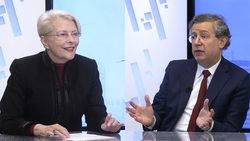
► Référence complète : E. Silva-Romero, "Droit de la Compliance : arbitrage international et géopolitique", entretien mené par M.-A. Frison-Roche à l'occasion d'une série d'entretiens sur le Droit de la Compliance, in Fenêtres ouvertes sur la gestion, émission de J.-Ph. Denis, Xerfi Canal, enregistré le 12 décembre 2023, diffusé le 27 avril 2024
____
🌐consulter sur LinkedIn la présentation en décembre 2023 de l'entretien avec Eduardo Silva-Romero
____
🌐lire la Newsletter MAFR. Law, Compliance, Regulation de mars 2024 sur la base de l'entretien avec Eduardo Silva-Romero
____
🎥visionner l'interview complète sur Xerfi Canal
____
► Point de départ : En 2023, Eduardo Silva-Romero a écrit une contribution:📝Quelle place pour la Compliance dans l'arbitrage d'investissement ?, dans l'ouvrage 📕La juridictionalisation de la Compliance
🧱lire la présentation de cette contribution ➡️cliquer ICI
____
► Résumé de l'entretien :
Marie-Anne Frison-Roche. Question : Quelle est la place de la Compliance dans l'arbitrage international d'investissement et, tout d'abord quelle est la spécificité de celui-ci ?
Edouardo Silva-Romero. Réponse. : L'arbitrage international d'investissement repose sur un traité, passé généralement entre deux Etats qui s'accordent pour protéger les investissements que les entreprises vont dans l'Etat-hôte, les disputes qui peuvent en résultent donner lieu à ce type spécifique d'arbitrage.
La Compliance y a une place particulière parce que si l'investissement est entaché de corruption ou s'il ne respecte pas les droits humains, il ne sera pas protégé par les arbitres, l'Etat-hôte n'étant plus contraint.
____
MaFR. Q. : Ainsi, par la Compliance, les États peuvent revendiquer leur souveraineté ?
E.S-R. R. : Oui, par la dimension sociale de la Compliance les Etats peuvent faire valoir leur conception sociale et l'imposer dans l'arbitrage d'investissement.
____
MaFR. Q. : L'attractivité de la place de Paris en est-elle servie ?
E.S-R. R. : La Cour Internationale d'Arbitrale a son siège à Paris et il est évident que cette présence, alliée à cette imprégnation humaniste de l'arbitrage d'investissement par la Compliance est un élément essentiel d'attractivité. En raison de la technicité qui s'y mêle, il est essentiels que les arbitres internationaux maîtrisent le droit de la compliance pour participer à cet élément nouveau d'attractivité, car celui-ci prend la forme de règles d'ordre public et c'est ainsi aussi que la Cour d'appel de Paris exerce son contrôle sur les sentences.
________
27 avril 2024
Interviews

► Référence complète : S. Pottier, "La contribution des entreprises à l'Europe de la Compliance", entretien mené par M.-A. Frison-Roche à l'occasion d'une série d'entretiens sur le Droit de la Compliance, in Fenêtres ouvertes sur la gestion, émission de J.-Ph. Denis, Xerfi Canal, enregistré le 12 décembre 2023, diffusé le 27 avril 2024
____
🌐consulter sur LinkedIn la présentation en décembre 2023 de l'entretien avec Stanislas Pottier
____
🌐lire la Newsletter MAFR. Law, Compliance, Regulation de mars 2024 sur la base de l'entretien avec Stanislas Pottier
____
🎥visionner l'interview complète sur Xerfi Canal
____
► Point de départ : En 2022, Stanislas Pottier a écrit une contribution : 📝Pour une Compliance européenne, vecteur d'affirmation économique et politique, dans l'ouvrage 📕Les Buts Monumentaux la Compliance
🧱lire la présentation de cette contribution ➡️cliquer ICI
____
► Résumé de l'entretien :
Marie-Anne Frison-Roche. Question : Quelle
Stanislas Pottier. Réponse. : L'
____
MaFR. Q. : Ainsi
S.P. R. : Oui,
____
MaFR. Q. : Ainsi
S.P. R. : Oui,
________

26 avril 2024
Organisation de manifestations scientifiques
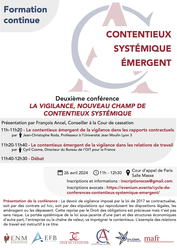
► Référence complète : La vigilance, nouveau champ de contentieux systémique, in cycle de conférences-débats "Contentieux Systémique Émergent", organisé à l'initiative de la Cour d'appel de Paris, avec la Cour de cassation, la Cour d'appel de Versailles, l'École nationale de la magistrature (ENM) et l'École de formation des barreaux du ressort de la Cour d'appel de Paris (EFB), sous la responsabilité scientifique de Marie-Anne Frison-Roche, 26 avril 2024, 11h-12h30, Cour d'appel de Paris, salle Massé
____
🧮consulter le programme complet du cycle Contentieux Systémique Émergent
____
🌐consulter sur LinkedIn le compte-rendu de cette manifestation
____
► Présentation de la conférence : Le devoir de vigilance imposé par la loi de 2017 se contractualise, soit par des contrats ad hoc, soit par des stipulations qui reproduisent les dispositions légales, les aménagent ou les dépassent. Cette reprise par le Droit des obligations est précieuse mais n’est pas sans risque. La portée systémique de la loi sous-jacente d’une part et des structures économiques d’autre part, l’entreprise ou la chaîne de valeur, va imprégner le contentieux. L’exemple des relations de travail est instructif à ce titre.
____
🧮Programme de cette manifestation :
Deuxième conférence-débat
LA VIGILANCE, NOUVEAU CHAMP DE CONTENTIEUX SYSTÉMIQUE
Cour d’appel de Paris, salle Massé
Présentation générale du sujet et modération par 🕴️François Ancel, Haut Conseiller à la Première Chambre civile de la Cour de cassation
🕰️11h-11h20. 🎤Le contentieux émergent de la Vigilance dans les rapports contractuels, par 🕴️Jean-Christophe Roda, Professeur à l’Université Jean-Moulin Lyon 3
🕰️11h20-11h40. 🎤Le contentieux émergent de la Vigilance dans les relations de travail, par 🕴️Cyril Cosme, Directeur du Bureau de l'OIT pour la France
🕰️11h40-12h30. Débat
____
🔴Les inscriptions et renseignements se font à l’adresse : inscriptionscse@gmail.com
🔴Pour les avocats, les inscriptions se font à l’adresse suivante : https://evenium.events/cycle-de-conferences-contentieux-systemique-emergent/
⚠️Les conférences-débat se tiennent en présentiel à la Cour d’appel de Paris.
________

22 avril 2024
Publications

🌐suivre Marie-Anne Frison-Roche sur LinkedIn
🌐s'abonner à la Newsletter MAFR Regulation, Compliance, Law
____
► Référence complète : M.-A. Frison-Roche, Trio, document de travail, mars 2024.
____
🎤 Ce document de travail a été élaboré pour servir de base à ma contribution aux Mélanges offert à Denis Mazeaud.
____
► Résumé du document de travail : Hommage à mon ami Denis.
____
🔓lire le document de travail ci-dessous⤵️
18 avril 2024
Publications
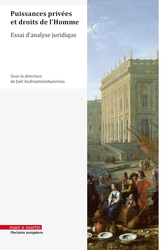
🌐suivre Marie-Anne Frison-Roche sur LinkedIn
🌐s'abonner à la Newsletter MAFR Regulation, Compliance, Law
🌐s'abonner à la Newsletter en vidéo MAFR Surplomb
____
► Référence complète : M.-A. Frison-Roche, "L’usage des puissances privées par le droit de la compliance pour servir les droits de l’homme", in J. Andriantsimbazovina (dir.), Puissances privées et droits de l'Homme. Essai d'analyse juridique, Mare Martin, coll. "Horizons européens", 2024, pp. 279-295
____
🚧lire le document de travail bilingue sur la base duquel cet article a été élaboré, doté de développements supplémentaires, de références techniques et de liens hypertextes
____
► Résumé de l'article : Si l’on suit la tradition du Droit l’on associera la puissance à une source légitime qu’est l’État, la puissance publique étant son apanage, les entreprises n’exerçant leur puissance que dans l’ombre portée de cette puissance Ex Ante. À l’inverse la trivialité du Droit économique, dont le Droit de la concurrence serait le cœur, consistant à partir de l’activité des entreprises qui utilisent leurs puissances sur des marchés, relèguent l’action de l’État au rang d’exception, admissible si celui-ci, qui prétend exercer cette puissance contraire, le justifie. La distribution des rôles est donc symétrique, en ce que les places sont échangées, mais le modèle de l’opposition est partagé. Ce modèle de l’opposition épuise les forces des organisations qui sont reléguées à n’être que soit le principe soit l’exception. Or, si l’on veut porter de grandes ambitions, par exemple concrétiser des droits humains au-delà du système juridique à l’intérieur duquel les Autorités publiques exercent leurs pouvoirs normatifs, il faut s’appuyer sur une nouvelle branche du Droit, remarquable par son pragmatisme et par l’ampleur des ambitions, y compris humanistes, qu’elle porte : le Droit de la Compliance.
Il apparaît que le Droit de la Compliance est ainsi la branche du Droit qui fait porter le souci d’autrui, concrétisé par des droits humains, par les entités en position de le satisfaire, entités que sont les entités systémiques, les grandes entreprises en étant l’exemple privilégié, sujets de droit directs de la Compliance (I). Il en résulte une nouvelle répartition entre les autorités publiques, légitimes à formuler le But Monumental de protéger les êtres humains, et les organisations privées, qui s’ajustent à cela selon le type de droits humains et au regard des moyens mis en place pour les préserver. Les entreprises sont recherchées parce qu’elles sont puissantes, en ce qu’elles sont en position de concrétiser les droits humains, dans leur indifférence au territoire, dans la centralisation des informations, des technologies et des moyens économiques, humains et financiers. Cette alliance est essentielle pour que le système ne conduise pas à un transfert de choix politique et que cela aboutisse à une efficience systémique. Il en résulte une nouvelle définition de la souveraineté telle qu’on la voit se dessiner dans l’espace numérique, lequel n’est pas un secteur particulier puisque c’est le monde qui s’est digitalisé, la question climatique justifiant la même nouvelle répartition des rôles (II).
____
________
8 avril 2024
Auditions par une commission ou un organisme public
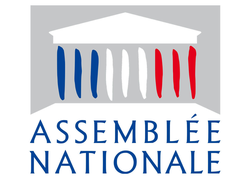
🌐suivre Marie-Anne Frison-Roche sur LinkedIn
🌐s'abonner à la Newsletter MAFR Regulation, Compliance, Law
🌐s'abonner à la Newsletter en vidéo MAFR Surplomb
____
► Référence complète : M.-A. Frison-Roche, audition par la Commission des Lois, Assemblée Nationale, sur la proposition de loi relative à la confidentialité des avis juridiques, 8 avril 2024.
____
J'ai eu l'occasion d'exprimer mon avis sur la nécessité pour le Droit français de mieux assurer la confidentialité des avis juridiques que les entreprises élaborent par un article publié en 2023 au Recueil Dalloz : "La compliance, socle de la confidentialité nécessaire des avis juridiques élaborés en entreprise".
C'est dans le prolongement de cet article et tant que spécialiste du Droit de la Régulation et de la Compliance que j'ai été conviée par la Commission des Lois de l'Assemblée Nationale à exposer mon opinion sur la Proposition de loi n°2022 relative à la confidentialité des consultations des juristes d'entreprises.
____
► Résumé de la présentation : J'ai montré qu'il faut partir non pas des personnes et pas même d'une façon centrale de l'information dont il s'agit mais des buts poursuivis, c'est-à-dire du Droit de la Compliance.
Or à ce propos il faut ne pas se fourvoyer. L'on pourrait le faire en commettant une confusion, souvent faite par réduction, entre la "conformité" mécanique et ce qu'est cette nouvelle branche du Droit : le Droit de la Compliance. La conformité n'est qu'un outil du Droit de la Compliance. Par souci du bon usage de la langue française, la Compliance apparaissant à beaucoup comme un terme américain, la proposition de loi utilise le terme "conformité" mais renvoie au Droit de la Compliance. La "conformité" n''est que l'obligation mécanique d'obéir aux règles applicables, ce qui est le sort de tout sujet de droit assujetti au Droit, position passive commune à tous dans un État de Droit.
Le Droit de la Compliance est tout autre chose, la conformité n'étant que l'un de ses outils. D'une part le Droit de la Compliance pose une obligation active et d'autre part il ne vise que certains sujets de Droit : les entreprises. Il s'agit pour elles de faire en sorte que certains buts visés par le Législateur soient effectivement atteints, ce qui devient effectivement et efficacement possible grâce à la puissance des entreprises ( puissance financière, d'organisation, de management, d'information, d'implantation, d'information). Ces "buts monumentaux" sont soit négatifs (éviter que les systèmes ne s'effondrent) soit positifs (faire en sorte que les systèmes s'améliorent).
Pour que les entreprises jouent ce rôle là, rôle qui n'est pas demandé aux autres assujettis "ordinaires" car ils ne sont pas "en position" de prendre une telle charge, notamment financière et d'organisation, ceux qui ont en charge de s'organiser et d'agir, les entreprises donc, doivent "détecter et prévenir" les défaillances des systèmes (ce que demandent des lois comme FCPA, Sapin 2, Vigilance, CSRD, CS3D, etc.). Pour "détecter et prévenir", ce qui est un ordre du Législateur, les entreprises doivent connaître les faiblesses de leur organisation et des personnes dont elles répondent afin d'y remédier : la "remédiation" est un "remède" pour assurer la "durabilité" des "systèmes".
Cet ensemble de notions-clés est au centre du Droit de la Compliance, branche du Droit ayant l'avenir pour objet.
Ce sont les avis juridiques, par exemple et notamment le rapport résultant des enquêtes internes, qui permettent à ceux qui décident et contrôlent de cette organisation (les managers) de remplir ce rôle que l'Etat leur a confié. Si ces avis ne sont pas confidentiels, le résultat n'est pas la remédiation et la préservation des systèmes globaux (systèmes concurrentiel, climatique, numérique, énergétique, bancaire, financier, etc.) : la solution managériale efficace consiste alors en Ex-Ante non plus à chercher l'information mais à l'inverse à ne pas chercher cette information, puisque son obtention entraînera l'affaiblissement de l'entreprise par la sanction que l'information produit, faute de confidentialité.
L'intérêt du système, de l'Etat et de l'entreprise sont disjoints, car que le Droit de la Compliance implique leur alliance, ce que produit la confidentialité des avis juridique.
C'est en cela que le Droit de la Compliance doit engendrer, par sa nature même, la confidentialité des avis juridiques.
____
Par ailleurs, interrogée sur le texte même de la proposition, j'ai estimé que l'exposé des motifs me paraissait particulièrement pertinent, puisque le lien entre le Droit de la Compliance (appelé certes "conformité" par un respect un peu trop mécanique de la langue juridique française dont pour l'instant le législateur français n'arrive pas à se départir....) apparaît clairement, que cette confidentialité est attachée au document, que l'entreprise peut y renoncer, qu'elle se distingue nettement du secret professionnel, ces trois éléments devant être approuvés.
J'ai pour ma part suggéré une modification en ce qui concerne la procédure, qui doit être effectivement ouverte sur le processus de confidentialité.
En effet, les Autorités publiques, par exemple les Autorités de Régulation, sont plutôt hostiles à cette confidentialité.
Ayant pour ma part beaucoup contribué à l'élaboration du Droit de la Régulation et continuant à le faire, j'estime que les Autorités de Régulation ont une logique qu'il faut comprendre. Elle est la suivante : les Autorités de Régulation sont en Ex-Ante (ce fut moins vrai pour l'Autorité de la concurrence, mais elle-aussi l'est de plus en plus) et sont en situation d'asymétrie d'information. Leur premier souci est de lutter contre cette asymétrie. Si l'on traduit cela en termes juridiques, cela signifie que pour réaliser leur mission d'intérêt général, elles recherchent tous les éléments d'information. Or, les avis juridiques, notamment le rapport de l'enquête d'interne, est ce que j'ai pu qualifier de "trésor probatoire". Dans leur logique, les Autorités de Régulation veulent s'en saisir.
L'on a donc un conflit entre deux logiques d'intérêt général : l'intérêt général des Buts Monumentaux du Droit de la Compliance activement servi par les entreprises, sur ordre de la Loi, qui requiert la confidentialité des avis juridiques, et l'intérêt général de l'action des Régulateurs qui luttent contre l'asymétrie d'information et recherchent à se saisir des trésors probatoires des avis juridiques.
Pour ma part, j'estime pour les raisons développées ci-dessus que les Buts Monumentaux de la Compliance doivent prévaloir. Et ce d'autant plus que les droits de la défense convergent pour cela.
Mais in fine c'est au juge, en cas de conflit ouvert, de mettre en équilibre ces deux prétentions qui se fondement sur le service de l'intérêt général.
Or, à lire le titre, il me paraît que la procédure, assez compliquée, confie cela à une multiplicité de juges... Mais puisque c'est bien le Droit de Compliance qui fonde le mieux de legal privilege "à la française", Droit de la Complique qui est le prolongement du Droit de la Régulation, et dont la pointe avancée est le Droit de la Vigilance, il serait plus adéquat et logique de confier ce contentieux à la compétence exclusive du Tribunal judiciaire de Paris.
Cela aurait un autre un effet heureux : sur recours, la dispute sera apportée devant la Cour d'appel de Paris, qui connaît en compétence exclusive (sauf exceptions) des contentieux sur les décisions sur les Autorités de Régulations. Les magistrats du pôle 5 (12 chambres spécialisées en Droit économique) sont aguerris et seraient adéquats pour faire cet équilibre nécessaire entre les deux intérêts généraux impliqués.
Je pense qu'une modification procédurale du texte dans ce sens serait bienvenue.
____
► Voir dans mes travaux ceux qui peuvent présenter un intérêt au regard de cette audition ⤵️
🕴️M.-A. Frison-Roche, 📝Le rôle du juge dans le déploiement du Droit de la Régulation par le Droit de la Compliance, in 📗Conseil d'État et Cour de cassation, De la Régulation à la Compliance : quel rôle pour le Juge ?, 2024.
🕴️M.-A. Frison-Roche, 📝Compliance et conformité : les distinguer pour mieux les articuler, 2024.
🕴️M.-A. Frison-Roche (dir.),📕L'obligation de compliance, 2024.
🕴️M.-A. Frison-Roche et M. Boissavy (dir.), 📕Compliance et droits de la défense, 2024.
🕴️M.-A. Frison-Roche (dir.), 📕 Compliance et droits de la défense, Les Buts Monumentaux de la compliance, 2022.
🕴️M.-A. Frison-Roche, 📝Contrat de compliance, clauses de compliance, 2022.
🕴️M.-A. Frison-Roche, 📝Le Droit de la compliance, 2016.
________
4 avril 2024
Publications
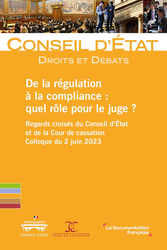
🌐suivre Marie-Anne Frison-Roche sur LinkedIn
🌐s'abonner à la Newsletter MAFR Regulation, Compliance, Law
____
► Référence complète : M.-A. Frison-Roche, "Le rôle du juge dans le déploiement du droit de la régulation par le droit de la compliance", in Conseil d'État et Cour de cassation, De la régulation à la compliance : quel rôle pour le juge ? Regards croisés du Conseil d'Etat et de la Cour de cassation - Colloque du 2 juin 2023, La Documentation française, coll. "Droits et Débats", 2024, pp. 173-182
____
🎥cet article fait suite à l'intervention de clôture prononcée lors du colloque biannuel organisé par la Cour de cassation et le Conseil d'État, qui portait en 2023 sur le thème De la régulation à la compliance : quel rôle pour le juge ?, le 2 juin 2023
____
🚧lire le document de travail bilingue sur la base duquel cet article a été élaboré, doté de développements supplémentaires, de références techniques et de liens hypertextes
____
► Présentation de l'article de synthèse : Il est remarquable de constater l'unité de conception et de pratiques entre les professionnels qui évoluent plutôt dans l'ordre des juridictions administratives et les professionnels qui évoluent plutôt dans l'ordre des juridictions judiciaires : ils constatent tous et dans des termes semblables un mouvement essentiel : ce qu'est le Droit de la Régulation, comment celui-ci a opéré sa transformation en Droit de la Compliance, et comment dans l'un et plus encore dans l'autre le Juge y est au centre.
Les juges, mais aussi les Régulateurs et les responsables européens l'expliquent et disent à partir d'exemples différents la transformation profonde que cela apporte pour le Droit, pour les entreprises en charge d'accroître l'effectivité systémique des règles par la pratique et la diffusion d'une culture de compliance.
Le Juge participant à cette transformation Ex Ante voit son office renouvelé, qu'il soit juge de droit public ou juge de droit privé, dans une unité accrue du système juridique.
____
► Résumé de l'article : La querelle de mots qui nous épuise, entre "Compliance" et "conformité", masque l'essentiel, c'est-à-dire la grande nouveauté d'une branche du Droit qui assume une vision humaniste exprimant l'ambition de modeler l'avenir, afin que celui-ci ne soit pas catastrophique (prévention de l'effondrement des systèmes), voire qu'il soit meilleur (protection des êtres humains dans ces systèmes).
L'article décrit tout d'abord l'émergence du Droit de la Compliance, en prolongement du Droit de la Régulation et en dépassement de celui-ci. Cette nouvelle branche du Droit rend compte d'un monde nouveau, en porte les bénéfices et veut parer à ces dangers systémiques pour que les êtres humains en bénéficient et n'en soient pas broyés. Cette branche du Droit Ex Ante est en cela politique, souvent portée par des Autorités publiques, comme les Autorités de Régulation, mais dépasse aujourd'hui les secteurs, comme le montre sa pointe avancée qu'en est le devoir de Vigilance.
Les "Buts Monumentaux" dans lesquels s'ancre normativement le Droit de la Compliance implique une interprétation téléologique, mène à une "responsabilisation" des opérateurs cruciaux, non seulement les Etats mais encore les entreprises, en charge de l'effectivité des multiples nouveaux outils de compliance.
L'article montre ensuite que le juge est toujours plus au centre du Droit de la Compliance. En effet, les procès visent à responsabiliser les entreprises. Dans cette transformation, le juge a aussi pour fonctionner de demeurer le gardien de l'Etat de Droit, aussi bien dans la protection des droits de la défense que dans celle des secrets, l'efficacité n'étant pas ce qui définit la Compliance, qui ne serait être réduite à une pure et simple méthode d'efficacité, ce qui mènerait à être un instrument de dictature. C'est pourquoi le principe de proportionnalité est essentiel dans le contrôle que le juge opère des exigences issues de cette branche du Droit si puissante.
Le juge est ainsi saisi d'un contentieux d'un type nouveau, de nature systémique, dans l'espace qui lui est propre et qu'il ne faut pas dénaturer : l'espace de justice.
____
________